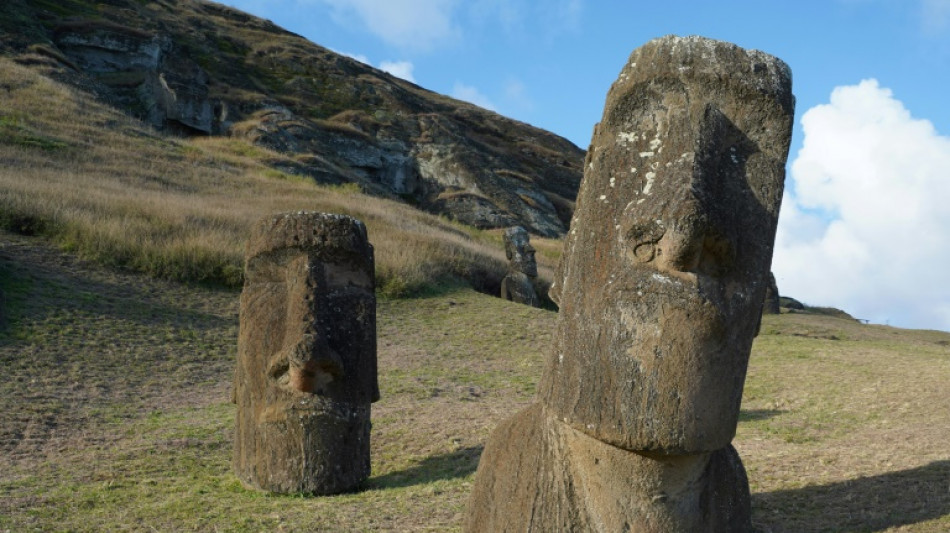
-
 Africa Cup of Nations to be held every four years after 2028 edition
Africa Cup of Nations to be held every four years after 2028 edition
-
Zelensky says US mooted direct Ukraine-Russia talks on ending war in Miami

-
 Armed conflict in Venezuela would be 'humanitarian catastrophe': Lula
Armed conflict in Venezuela would be 'humanitarian catastrophe': Lula
-
Chelsea fightback in Newcastle draw eases pressure on Maresca

-
 FIFA Best XI 'a joke' rages Flick over Raphinha snub
FIFA Best XI 'a joke' rages Flick over Raphinha snub
-
Swiss Von Allmen pips Odermatt to Val Gardena downhill

-
 Vonn claims third podium of the season at Val d'Isere
Vonn claims third podium of the season at Val d'Isere
-
India drops Shubman Gill from T20 World Cup squad

-
 Tens of thousands attend funeral of killed Bangladesh student leader
Tens of thousands attend funeral of killed Bangladesh student leader
-
England 'flat' as Crawley admits Australia a better side

-
 Australia four wickets from Ashes glory as England cling on
Australia four wickets from Ashes glory as England cling on
-
Beetles block mining of Europe's biggest rare earths deposit

-
 French culture boss accused of mass drinks spiking to humiliate women
French culture boss accused of mass drinks spiking to humiliate women
-
Burning effigy, bamboo crafts at once-a-decade Hong Kong festival

-
 Joshua knocks out Paul to win Netflix boxing bout
Joshua knocks out Paul to win Netflix boxing bout
-
Dogged Hodge ton sees West Indies save follow-on against New Zealand

-
 England dig in as they chase a record 435 to keep Ashes alive
England dig in as they chase a record 435 to keep Ashes alive
-
Wembanyama 26-point bench cameo takes Spurs to Hawks win

-
 Hodge edges towards century as West Indies 310-4, trail by 265
Hodge edges towards century as West Indies 310-4, trail by 265
-
US Afghans in limbo after Washington soldier attack

-
 England lose Duckett in chase of record 435 to keep Ashes alive
England lose Duckett in chase of record 435 to keep Ashes alive
-
Australia all out for 349, set England 435 to win 3rd Ashes Test

-
 US strikes over 70 IS targets in Syria after attack on troops
US strikes over 70 IS targets in Syria after attack on troops
-
Australian lifeguards fall silent for Bondi Beach victims

-
 Trump's name added to Kennedy Center facade, a day after change
Trump's name added to Kennedy Center facade, a day after change
-
West Indies 206-2, trail by 369, after Duffy's double strike

-
 US strikes Islamic State group in Syria after deadly attack on troops
US strikes Islamic State group in Syria after deadly attack on troops
-
Awake Breast Augmentation: Gruber Plastic Surgery Highlights Live Implant Sizing Under Local Anesthesia With No Sedation for Eligible Patients

-
 Epstein files opened: famous faces, many blacked-out pages
Epstein files opened: famous faces, many blacked-out pages
-
Ravens face 'special' Patriots clash as playoffs come into focus

-
 Newly released Epstein files: what we know
Newly released Epstein files: what we know
-
Musk wins US court appeal of $56 bn Tesla pay package

-
 US judge voids murder conviction in Jam Master Jay killing
US judge voids murder conviction in Jam Master Jay killing
-
Trump doesn't rule out war with Venezuela

-
 Haller, Aouar out of AFCON, Zambia coach drama
Haller, Aouar out of AFCON, Zambia coach drama
-
Nasdaq rallies again while yen falls despite BOJ rate hike

-
 Bologna win shoot-out with Inter to reach Italian Super Cup final
Bologna win shoot-out with Inter to reach Italian Super Cup final
-
Brandt and Beier send Dortmund second in Bundesliga

-
 Trump administration begins release of Epstein files
Trump administration begins release of Epstein files
-
UN Security Council votes to extend DR Congo mission by one year

-
 Family of Angels pitcher, club settle case over 2019 death
Family of Angels pitcher, club settle case over 2019 death
-
US university killer's mystery motive sought after suicide

-
 Rubio says won't force deal on Ukraine as Europeans join Miami talks
Rubio says won't force deal on Ukraine as Europeans join Miami talks
-
Burkinabe teen behind viral French 'coup' video has no regrets

-
 Brazil court rejects new Bolsonaro appeal against coup conviction
Brazil court rejects new Bolsonaro appeal against coup conviction
-
Three-time Grand Slam winner Wawrinka to retire in 2026

-
 Man Utd can fight for Premier League title in next few years: Amorim
Man Utd can fight for Premier League title in next few years: Amorim
-
Pandya blitz powers India to T20 series win over South Africa

-
 Misinformation complicated Brown University shooting probe: police
Misinformation complicated Brown University shooting probe: police
-
IMF approves $206 mn aid to Sri Lanka after Cyclone Ditwah


'Ecocide' on Easter Island never took place, studies suggest
Two recent studies have cast doubt on a popular theory that the ancient residents of Easter Island suffered a societal collapse because they overexploited their natural resources, an event often labelled one of history's first "ecocides".
Easter Island, located in the Pacific Ocean 3,700 kilometres (2,300 miles) from the coast of Chile, is best known for the enigmatic "moai" stone statues of humans carved by the Rapanui people.
A widespread theory popularised by historians including US author Jared Diamond claimed that the Rapanui deforested the small island -- which is known to have once been covered in palm trees -- to keep supporting the flourishing culture of its more than 15,000 inhabitants.
The sudden lack of resources is said to have triggered a brutal period of famine and warfare that escalated into cannibalism and ended in a demographic and cultural collapse.
This event in the 1600s abruptly brought an end to the creation of new moai statues -- or so the story goes.
When Europeans first arrived at the island in 1722, they estimated there were only around 3,000 inhabitants.
This tale of ecological suicide -- or "ecocide" -- by the Rapanui "has been presented as a warning tale for humanity's overexploitation of resources," according to the authors of a study published in the journal Nature on Wednesday.
The international team of experts in population genetics tried to find signs of the societal collapse using an advanced statistical tool that reconstructs the genomic history of a people.
They analysed the genomes of 15 Rapanui who lived between 1670 and 1950 -- and found no sign of a societal collapse, which would have caused a sudden reduction in genetic diversity.
"Our genetic analysis shows a stably growing population from the 13th century through to European contact in the 18th century," said study author Barbara Sousa da Mota of the University of Lausanne.
"This stability is critical because it directly contradicts the idea of a dramatic pre-contact population collapse."
The research also shed light on contact between the island's residents and Native Americans well before Christopher Columbus arrived in the Americas -- another controversial moment in the history of the Polynesian people.
- Different method, same conclusion -
The new research reinforced the findings of a different study published in June in the journal Science Advances which took a very different approach.
That the two studies reached the same conclusion "shows the importance of looking at the same scientific question from different disciplines," Sousa da Mota told AFP.
The team behind the June study used satellite images to map out rock gardens on the island. Rock gardening is an agricultural method that involves mixing rocks into the soil to preserve nutrients and moisture.
Previous research had claimed that up to 21 square kilometres of the small island -- 12 percent of the total of 164 square kilometres -- was covered with these gardens, which would have been necessary to sustain more than 15,000 people.
- 'We can learn from them' -
But the US-based researchers determined that only 0.76 square kilometres of the island were used as rock gardens.
Such a small harvest of sweet potatoes -- essential to the Rapanui's diet -- from these gardens could not have supported more than 4,000 people, the researchers estimated.
That is close to the number of people that Europeans first found on the island, indicating there never was a society of 15,000 or more that endured a terrifying collapse.
"When we label an entire culture as an example of bad choices, or as a cautionary tale of what not to do, we had better be right, otherwise we feed stereotypes (which themselves have profound consequences on people)," Dylan Davis, a co-author of the Science Advances study, told AFP.
"In this case, the Rapanui managed to survive in one of the most remote places on Earth and did so fairly sustainably until European contact," said the environmental archaeologist at Columbia University.
"This suggests we can learn something from them about how to manage limited resources."
M.Thompson--AMWN


